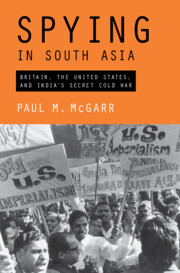Book contents
- Spying in South Asia
- Spying in South Asia
- Copyright page
- Contents
- Figures
- Acknowledgements
- A Note on Place Names
- Abbreviations
- Introduction
- 1 Transfer of Power: British Intelligence and the End of Empire in South Asia
- 2 Silent Partners: Britain, India, and Early Cold War Intelligence Liaison
- 3 India’s Rasputin: V. K. Krishna Menon and the Spectre of Indian Communism
- 4 Quiet Americans: The CIA and the Onset of the Cold War in South Asia
- 5 Confronting China: The Sino-Indian War and Collaborative Covert Action
- 6 Peddling Propaganda: The Information Research Department and India
- 7 From Russia with Love: Dissidents and Defectors in Cold War India
- 8 The Foreign Hand: Indira Gandhi and the Politics of Intelligence
- 9 Battle of the Books: Daniel Patrick Moynihan, Seymour Hersh, and India’s CIA ‘Agents’
- 10 Indian Intelligence and the End of the Cold War
- Conclusion
- Notes
- Bibliography
- Index
8 - The Foreign Hand: Indira Gandhi and the Politics of Intelligence
Published online by Cambridge University Press: 12 September 2024
- Spying in South Asia
- Spying in South Asia
- Copyright page
- Contents
- Figures
- Acknowledgements
- A Note on Place Names
- Abbreviations
- Introduction
- 1 Transfer of Power: British Intelligence and the End of Empire in South Asia
- 2 Silent Partners: Britain, India, and Early Cold War Intelligence Liaison
- 3 India’s Rasputin: V. K. Krishna Menon and the Spectre of Indian Communism
- 4 Quiet Americans: The CIA and the Onset of the Cold War in South Asia
- 5 Confronting China: The Sino-Indian War and Collaborative Covert Action
- 6 Peddling Propaganda: The Information Research Department and India
- 7 From Russia with Love: Dissidents and Defectors in Cold War India
- 8 The Foreign Hand: Indira Gandhi and the Politics of Intelligence
- 9 Battle of the Books: Daniel Patrick Moynihan, Seymour Hersh, and India’s CIA ‘Agents’
- 10 Indian Intelligence and the End of the Cold War
- Conclusion
- Notes
- Bibliography
- Index
Summary
In the late 1960s, a spotlight cast upon some of the CIA’s more questionable activities in the subcontinent had a profound and enduring impact on Indian perceptions of the United States’ government and its external intelligence service. In the wake of the Ramparts scandal, the CIA came to occupy a prominent place in mainstream Indo–U.S. cultural and political discourse. For the remainder of the twentieth-century, and beyond, anti-American elements in India drew repeatedly upon the spectre of CIA subversion as a means of undermining New Delhi’s relationship with Washington. The blanket exposure given by the world’s press to CIA indiscretions, exemplified by the international media circus surrounding Congressional probes into the U.S. intelligence community, made a deep psychological impression in South Asia. This chapter traces the socio-political impact of Indira Gandhi’s assertions that the malevolent hand of the CIA lay behind India’s problems, foreign and domestic. It recovers South Asian agency in intelligence terms by interrogating the utility of Gandhi’s policy of exploiting the CIA’s reputation as a socio-political malefactor to court popular legitimacy.
- Type
- Chapter
- Information
- Spying in South AsiaBritain, the United States, and India's Secret Cold War, pp. 181 - 208Publisher: Cambridge University PressPrint publication year: 2024

